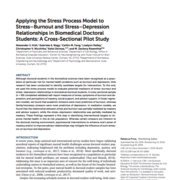
Although doctoral students in the biomedical sciences have been recognized as a population at particular risk for mental health problems such as burnout and depression, little research has been conducted to identify candidate targets for intervention. To this end, we used the stress process model to evaluate potential mediators of stress–burnout and stress–depression relationships in biomedical doctoral students. A cross-sectional sample (n = 69) completed validated self-report measures of stress; symptoms of burnout and depression; and perceptions of mastery, social support, and advisor support. In linear regression models, we found that academic stressors were most predictive of burnout, whereas family/monetary stressors were most predictive of depression. In mediation models, we found that the relationship between stress and burnout was partially mediated by mastery and advisor support, while the stress–depression relationship was partially mediated by mastery. These findings represent a first step in identifying interventional targets to improve mental health in this at-risk population. Whereas certain stressors are inherent to the doctoral training environment, psychosocial interventions to enhance one’s sense of mastery and/or to improve advisor relationships may mitigate the influence of such stressors on burnout and depression.
Read more here.